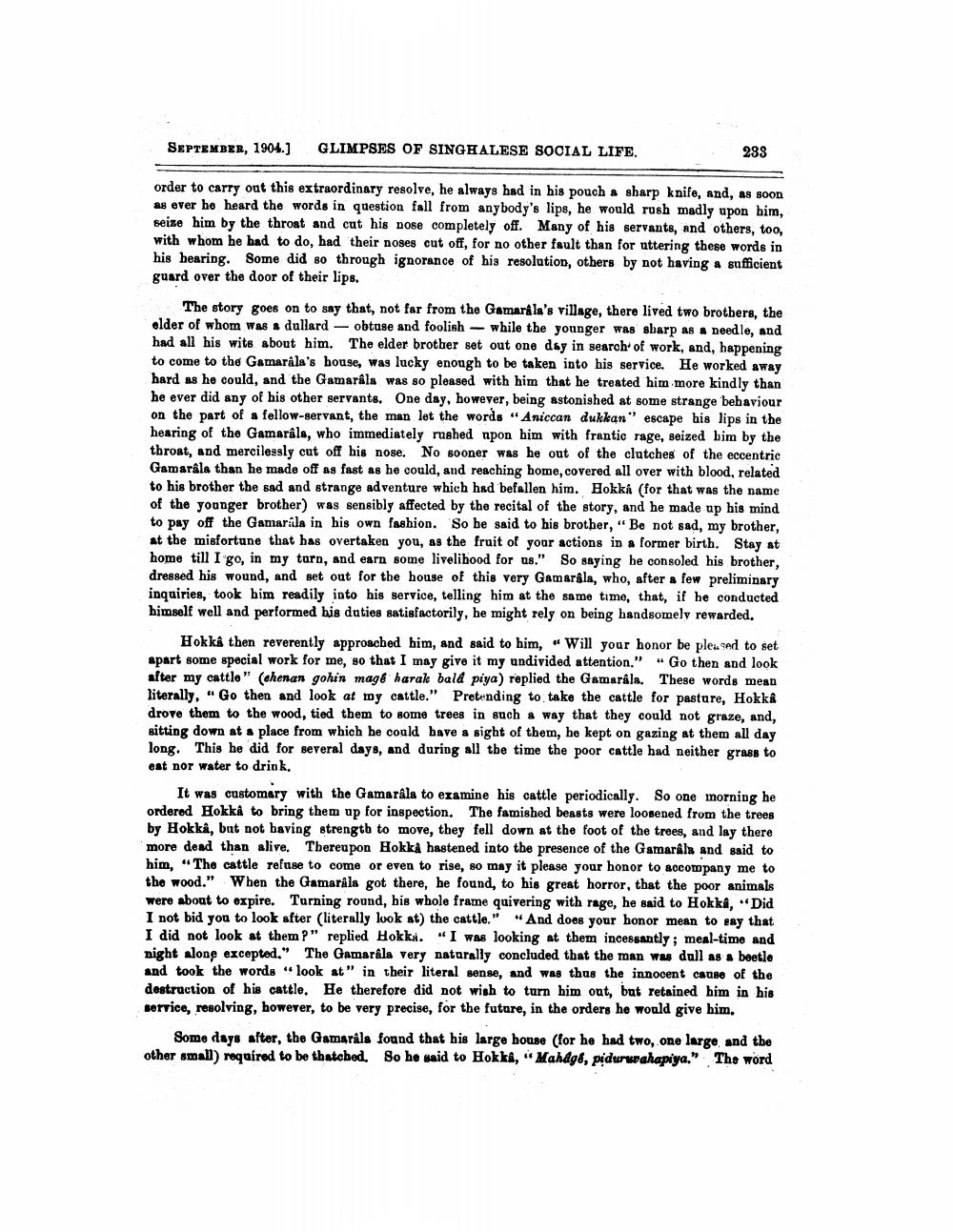________________
SEPTEMBER, 1904.)
GLIMPSES OF SINGHALESE SOCIAL LIFE.
238
order to carry out this extraordinary resolve, he always had in his pouch a sharp knife, and, as soon as ever he heard the words in question fall from anybody's lips, he would rush madly upon him, seize him by the throat and cut his nose completely off. Many of his servants, and others, too, with whom he had to do, had their noses cut off, for no other fault than for uttering these words in his hearing. Some did so through ignorance of his resolution, others by not having a sufficient guard over the door of their lips.
The story goes on to say that, not far from the Gamarala's village, there lived two brothers, the older of whom was a dullard - obtuse and foolish - while the younger was sharp as a needle, and had all his wits about him. The elder brother set out one day in search of work, and, happening to come to the Gamarala's house, was lucky enough to be taken into his service. He worked away hard as he could, and the Gamarála was so pleased with him that he treated him more kindly than he ever did any of his other servants. One day, however, being astonished at some strange behaviour on the part of a fellow-servant, the man let the words "Aniccan dukkan" escape his lips in the hearing of the Gamarála, who immediately rushed npon him with frantic rage, seized bim by the throat, and mercilessly cut off his nose. No sooner was he out of the clutches of the eccentric Gamarala than he made off as fast as he could, and reaching home, covered all over with blood, related to his brother the sad and strange adventure which had befallen him. Hokkå (for that was the name of the younger brother) was sensibly affected by the recital of the story, and he made up his mind to pay off the Gamarala in his own fashion. So be said to his brother, "Be not sad, my brother, at the misfortune that has overtaken you, as the fruit of your actions in a former birth. Stay at home till I go, in my turn, and earn some livelihood for us." So saying he consoled his brother, dressed his wound, and set out for the house of this very Gamargla, who, after a few preliminary inquiries, took him readily into his service, telling him at the same time, that, if he conducted himself well and performed his duties satisfactorily, he might rely on being handsomely rewarded.
Hokkå then reverently approached him, and said to him, “Will your honor be pleased to set apart some special work for me, so that I may give it my undivided attention." - Go then and look after my cattle" (ehenan gohin mage harak bald piya) replied the Gamarála. These words mean literally, “Go then and look at my cattle." Pretending to take the cattle for pasture, Hokkê drove them to the wood, tied them to some trees in such a way that they could not graze, and, sitting down at a place from which he could have a sight of them, he kept on gazing at them all day long. This he did for several days, and during all the time the poor cattle had neither grass to est nor water to drink.
It was customary with the Gamarala to examine his cattle periodically. So one morning he ordered Hokkå to bring them up for inspection. The famished beasts were loosened from the trees by Hokkå, but not having strength to move, they fell down at the foot of the trees, and lay there more dead than alive. Thereupon Hokkå hastened into the presence of the Gamarala and said to him, “The cattle refuse to come or even to rise, so may it please your honor to accompany me to the wood." When the Gamarála got there, he found, to his great horror, that the poor animals were about to expire. Turning round, bis whole frame quivering with rage, he said to Hokka, Did I not bid you to look after (literally look at) the cattle." "And does your honor mean to say that I did not look at them?" replied Hokk.. "I was looking at them incessantly; meal-time and night alone excepted." The Gamarála very naturally concluded that the man was dull as a beetle and took the words " look at " in their literal sense, and was thus the innocent cause of the destruction of his cattlo. He therefore did not wish to turn him out, but retained him in his service, resolving, however, to be very precise, for the future, in the orders he would give him.
Some days after, the Gamaráls found that his large house (for he had two, one large and the other small) required to be thatched. So he said to Hokka, Mahaga, pidurwahapiya." The word




